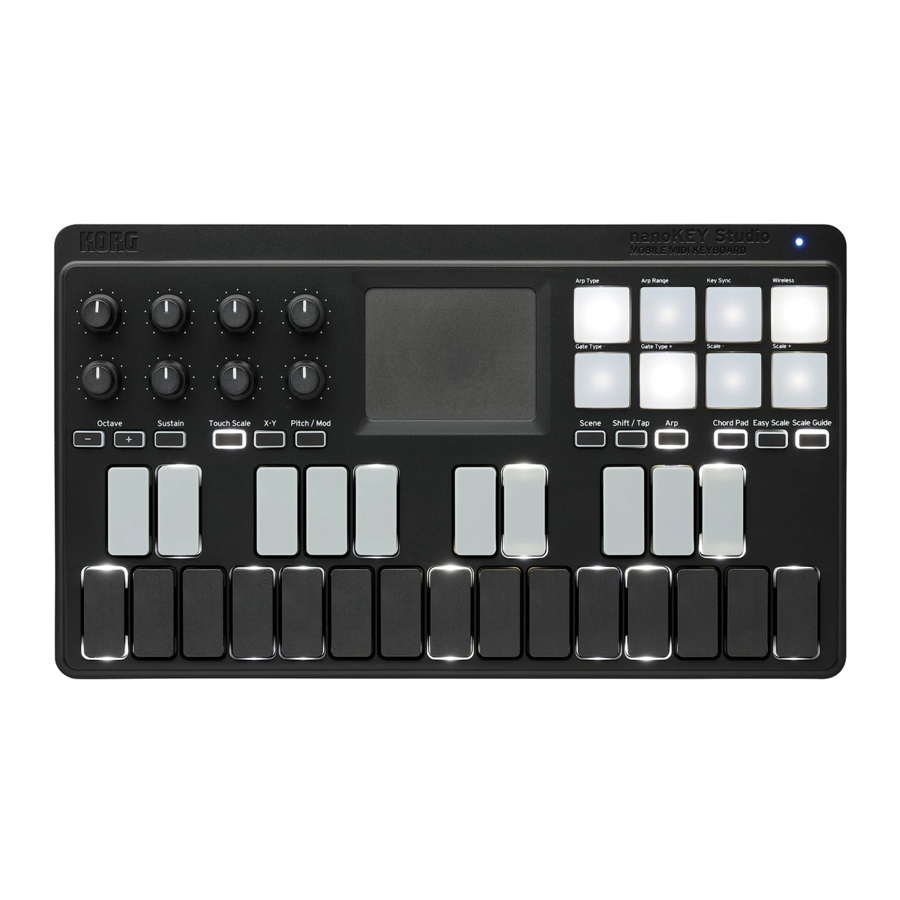
Korg nanoKEY Studio (EFGSJ 4) Manual
- Owner's manual (27 pages) ,
- Quick start manual (7 pages) ,
- Quick start manual (7 pages)
Advertisement

Introduction
Thank you for purchasing the Korg nanoKEY Studio Mobile MIDI keyboard. To ensure trouble-free enjoyment, carefully read this Quick Start Guide and the Owner's Manual and use the product correctly.

Part names

- Mode switch
- USB port
- Knobs
- Octave buttons
- Sustain button
- Touch Scale button
- X-Y button
- Pitch/Mod button
- Touchpad
- Power LED
- Trigger Pads
- Eazy Scale button
- Scale Guide button
- Chord Pad button
- Scene button
- Shift/Tap button
- Arp button
- Keyboard
Specifications
| Wireless method: | Bluetooth low energy |
| Jacks: | USB port (micro Type B) |
| Power supply: | USB bus power supply or two AAA batteries (alkaline or nickel-metal hydride batteries) |
| Battery service life: | Approx. 10 hours (when using alkaline batteries: Battery life will vary depending on the batteries used and on the conditions of use.) |
| Current consumption: | 500 mA or less |
| Dimensions (W × D × H): | 278 × 160 × 33 mm/10.94" × 6.29" × 1.29" |
| Weight: | 471 g/1.04 lbs (excluding batteries) |
| Included items: | USB cable, Quick Start Guide |
* For the purpose of improvement, the specifications and appearance are subject to change without notice.
Operating requirements
See the KORG website for the latest information on OS support.
https://www.korg.com/support/os/
Using a wireless connection
Installing Batteries
Make sure that the mode switch is set to "Standby", and then slide out the battery cover on the rear to open it. Making sure to observe the correct polarity, insert the batteries, and then close the battery cover.


* Batteries are not included, so please obtain them separately.
Turning On the Power
Set the mode switch to " (Battery)."
(Battery)."
The power turns on, the power LED blinks, and the device waits for a connection (Battery mode).


 (Battery)", the batteries will become depleted, even with a USB connection. In addition, the nanoKEY Studio cannot be used as a USB-MIDI device, even if it is connected to a computer using a USB cable.
(Battery)", the batteries will become depleted, even with a USB connection. In addition, the nanoKEY Studio cannot be used as a USB-MIDI device, even if it is connected to a computer using a USB cable.
Wireless connection procedure
For details on connecting to an iPhone/iPad or Mac, or to a Windows PC, refer to "Bluetooth MIDI Connection Guide." Download the latest version of the "Bluetooth MIDI Connection Guide" from the Korg website (www.korg.com).

Turning Off the Power
Set the mode switch to "Standby". The nanoKEY Studio and the power LED turn off.
Auto Power-Off Function
In Battery mode, the nanoKEY Studio is automatically turned off if no operation is performed for an extended period of time. This function can be disabled in KORG KONTROL Editor. For details, refer to the Owner's Manual.
Using a USB connection
Making Connections and Turning On the Power
- Set the mode switch to "
![]() (USB)".
(USB)". - Use the included USB cable to connect the nanoKEY Studio to a USB port on your computer. The nanoKEY Studio turns on, and the power LED lights up.
![]()
The included USB cable must be used.
In order to use the nanoKEY Studio functions, settings must be specified to match your app. Refer to the Owner's Manual and specify the settings.
TIP
Windows Users: When the nanoKEY Studio is first connected to your Windows computer, the USB-MIDI driver pre-installed with the operating system will be used automatically. This pre-installed USBMIDI driver will not allow the nanoKEY Studio to access multiple programs or applications at the same time. To remedy this situation, simply download the KORG USB-MIDI driver at www.korg.com and install the driver as instructed with the supporting documentation.
Turning Off the Power
Set the mode switch to "Standby". The nanoKEY Studio and the power LED turn off.
Precautions
Location
Using the unit in the following locations can result in a malfunction.
- In direct sunlight
- Locations of extreme temperature or humidity
- Excessively dusty or dirty locations
- Locations of excessive vibration
- Close to magnetic fields
Power supply
Be sure to turn the power switch to OFF when the unit is not in use. Remove the battery in order to prevent it from leaking when the unit is not in use for extended periods.
Interference with other electrical devices
Radios and televisions placed nearby may experience reception interference. Operate this unit at a suitable distance from radios and televisions.
Handling
To avoid breakage, do not apply excessive force to the switches or controls.
Care
If the exterior becomes dirty, wipe it with a clean, dry cloth. Do not use liquid cleaners such as benzene or thinner, or cleaning compounds or flammable polishes.
Keep this manual
After reading this manual, please keep it for later reference.
Keeping foreign matter out of your equipment
Never set any container with liquid in it near this equipment. If liquid gets into the equipment, it could cause a breakdown, fire, or electrical shock. Be careful not to let metal objects get into the equipment.
Documents / Resources
References
Download manual
Here you can download full pdf version of manual, it may contain additional safety instructions, warranty information, FCC rules, etc.
Advertisement
 (USB)".
(USB)".



















Need help?
Do you have a question about the nanoKEY Studio and is the answer not in the manual?
Questions and answers